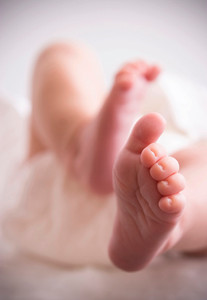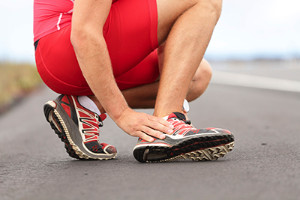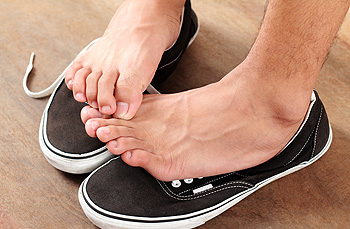Bremerton | Port Orchard (360) 377-2233
 When it comes to caring for your child’s feet, it’s important you look for symptoms of any existing or developing foot conditions. One common condition that can develop among babies and young children is an ingrown toenail. Ingrown toenails are characterized by a toenail that grows into the skin on the side of the toe, often appearing red and swollen. Typically, it is more common that the big toe is affected by this condition. In more severe cases, a white or yellowish liquid may drain from the affected toe, which normally is a sign that an infection in present. To help prevent this condition from afflicting your child’s toes, it’s recommended that you make sure you’re cutting their toenails straight across and that they wear footwear that is not too constricting or tightly fitted. Ingrown toenails are often quite painful and should be treated with professional care. For a safe recovery, and to avoid the development of an infection, we suggest you consult with a podiatrist as soon as possible to treat your child’s ingrown toenail.
When it comes to caring for your child’s feet, it’s important you look for symptoms of any existing or developing foot conditions. One common condition that can develop among babies and young children is an ingrown toenail. Ingrown toenails are characterized by a toenail that grows into the skin on the side of the toe, often appearing red and swollen. Typically, it is more common that the big toe is affected by this condition. In more severe cases, a white or yellowish liquid may drain from the affected toe, which normally is a sign that an infection in present. To help prevent this condition from afflicting your child’s toes, it’s recommended that you make sure you’re cutting their toenails straight across and that they wear footwear that is not too constricting or tightly fitted. Ingrown toenails are often quite painful and should be treated with professional care. For a safe recovery, and to avoid the development of an infection, we suggest you consult with a podiatrist as soon as possible to treat your child’s ingrown toenail.
Making sure that your children maintain good foot health is very important as they grow. If you have any questions, contact one of our doctors of Kitsap Foot & Ankle Clinic. Our doctors can provide the care you need to keep you pain-free and on your feet.
Keeping Children's Feet Healthy
Having healthy feet during childhood can help prevent medical problems later in life, namely in the back and legs. As children grow, their feet require different types of care. Here are some things to consider...
Although babies do not walk yet, it is still very important to take care of their feet.
Avoid putting tight shoes or socks on his or her feet.
Allow the baby to stretch and kick his or her feet to feel comfortable.
As a toddler, kids are now on the move and begin to develop differently. At this age, toddlers are getting a feel for walking, so don’t be alarmed if your toddler is unsteady or ‘walks funny’.
As your child gets older, it is important to teach them how to take care of their feet.
Show them proper hygiene to prevent infections such as fungus.
Be watchful for any pain or injury.
Have all injuries checked by a doctor as soon as possible.
Comfortable, protective shoes should always be worn, especially at play.
If you have any questions please feel free to contact one of our offices located in Bremerton and Port Orchard, WA . We offer the newest diagnostic and treatment technologies for all your foot and ankle needs.
 People who enjoy the sport of running are most likely familiar with the importance of properly warming up before and after each run. The ankles may become more stable when leg swings are practiced frequently, followed by performing hip circles. Research has indicated that running injuries may be prevented when you focus on a specific type of running, and train accordingly. These can consist of increasing speed, endurance, or running up and down hills. Practicing squats is an effective way of increasing the range of motion in your ankles, hips, and knees. If you would like additional information about how running injuries can affect the feet and how to prevent them, please consult with a podiatrist.
People who enjoy the sport of running are most likely familiar with the importance of properly warming up before and after each run. The ankles may become more stable when leg swings are practiced frequently, followed by performing hip circles. Research has indicated that running injuries may be prevented when you focus on a specific type of running, and train accordingly. These can consist of increasing speed, endurance, or running up and down hills. Practicing squats is an effective way of increasing the range of motion in your ankles, hips, and knees. If you would like additional information about how running injuries can affect the feet and how to prevent them, please consult with a podiatrist.
Exercising your feet regularly with the proper foot wear is a great way to prevent injuries. If you have any concerns about your feet, contact one of our doctors of Kitsap Foot & Ankle Clinic. Our doctors will treat your foot and ankle needs.
How to Prevent Running Injuries
Many common running injuries are caused by overuse and overtraining. When the back of the kneecap starts wearing out and starts causing pain in your knee, this is commonly referred to as runner’s knee. Runner’s knee is a decrease in strength in your quadriceps and can occur if you’re not wearing properly fitted or supporting shoes. To prevent runner’s knee, focusing on hip strengthening is a good idea, as well as strengthening your quads to keep the kneecaps aligned.
What Are Some Causes of Running Injuries?
- One cause of a common running injury is called iliotibial band syndrome.
- Plantar fasciitis is also another common injury.
- Stress fractures can occur from overtraining, lack of calcium, or even your running style.
Best Ways to Prevent Running Injuries
- Wear footwear that fits properly and suits your running needs.
- Running shoes are the only protective gear that runners have to safeguard them from injury.
- Make a training schedule. Adding strengthening exercises as well as regular stretching can help keep you strong and limber and can lessen the possibility of injuries.
- Stretching keeps muscles limber; this will help you gain better flexibility.
If you have any questions please feel free to contact one of our offices located in Bremerton and Port Orchard, WA . We offer the newest diagnostic and treatment technologies for all your foot and ankle needs.
 Foot conditions are generally a common ailment among pregnant women. The weight from increased blood volume, as well as the growing fetus, may cause the feet to become flat, which can produce sharp or aching pains. Moderate relief may be found when shoes that are worn fit properly. To ensure a perfect fit and for extra support, it may help to wear custom-made orthotics. Additionally, swollen feet and ankles are a common ailment among pregnant patients, and can be uncomfortable. It is beneficial to elevate the feet frequently during the day, as this may help to reduce existing swelling. Some pregnant women experience ingrown toenails, which may be a result of changes in the size and shape of the toenail. If you would like more information about how your feet may be affected during pregnancy, it is recommended that you consult with a podiatrist.
Foot conditions are generally a common ailment among pregnant women. The weight from increased blood volume, as well as the growing fetus, may cause the feet to become flat, which can produce sharp or aching pains. Moderate relief may be found when shoes that are worn fit properly. To ensure a perfect fit and for extra support, it may help to wear custom-made orthotics. Additionally, swollen feet and ankles are a common ailment among pregnant patients, and can be uncomfortable. It is beneficial to elevate the feet frequently during the day, as this may help to reduce existing swelling. Some pregnant women experience ingrown toenails, which may be a result of changes in the size and shape of the toenail. If you would like more information about how your feet may be affected during pregnancy, it is recommended that you consult with a podiatrist.
Pregnant women with swollen feet can be treated with a variety of different methods that are readily available. For more information about other cures for swollen feet during pregnancy, consult with one of our doctors from Kitsap Foot & Ankle Clinic. Our doctors will attend to all of your foot and ankle needs.
What Foot Problems Can Arise During Pregnancy?
One problem that can occur is overpronation, which occurs when the arch of the foot flattens and tends to roll inward. This can cause pain and discomfort in your heels while you’re walking or even just standing up, trying to support your baby.
Another problem is edema, or swelling in the extremities. This often affects the feet during pregnancy but tends to occur in the later stages.
How Can I Keep My Feet Healthy During Pregnancy?
If you have any questions please feel free to contact one of our offices located in Bremerton and Port Orchard, WA . We offer the newest diagnostic and treatment technologies for all your foot and ankle needs.
 The medical ailment that is known as athlete’s foot often causes discomfort. It is a fungus that affects the skin on the feet. It can produce symptoms that may consist of intense itching between the toes and on the bottom of the feet, the skin may become dry and cracked, and the toenails may become discolored. This condition can develop as a result of wearing shoes and socks that are too tight, and walking barefoot in public areas that include swimming pools, locker rooms, and communal showers. This contagious fungus lives and thrives in warm and moist environments, which is why it is recommended to wear appropriate shoes while in these places. If you have become afflicted with athlete’s foot, it is advised that you are under the care of a podiatrist who can determine the best course of treatment for you.
The medical ailment that is known as athlete’s foot often causes discomfort. It is a fungus that affects the skin on the feet. It can produce symptoms that may consist of intense itching between the toes and on the bottom of the feet, the skin may become dry and cracked, and the toenails may become discolored. This condition can develop as a result of wearing shoes and socks that are too tight, and walking barefoot in public areas that include swimming pools, locker rooms, and communal showers. This contagious fungus lives and thrives in warm and moist environments, which is why it is recommended to wear appropriate shoes while in these places. If you have become afflicted with athlete’s foot, it is advised that you are under the care of a podiatrist who can determine the best course of treatment for you.
Athlete’s foot is an inconvenient condition that can be easily reduced with the proper treatment. If you have any concerns about your feet and ankles, contact one of our doctors from Kitsap Foot & Ankle Clinic. Our doctors will treat your foot and ankle needs.
Athlete’s Foot: The Sole Story
Athlete's foot, also known as tinea pedis, can be an extremely contagious foot infection. It is commonly contracted in public changing areas and bathrooms, dormitory style living quarters, around locker rooms and public swimming pools, or anywhere your feet often come into contact with other people.
Solutions to Combat Athlete’s Foot
Athlete’s foot can cause many irritating symptoms such as dry and flaking skin, itching, and redness. Some more severe symptoms can include bleeding and cracked skin, intense itching and burning, and even pain when walking. In the worst cases, Athlete’s foot can cause blistering as well. Speak to your podiatrist for a better understanding of the different causes of Athlete’s foot, as well as help in determining which treatment options are best for you.
If you have any questions please feel free to contact one of our offices located in Bremerton and Port Orchard, WA . We offer the newest diagnostic and treatment technologies for all your foot and ankle needs.